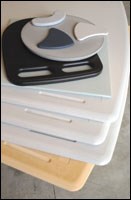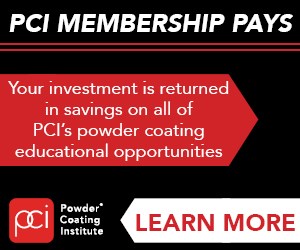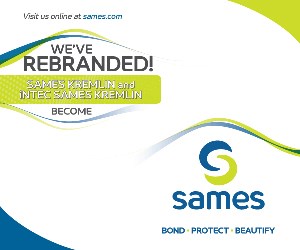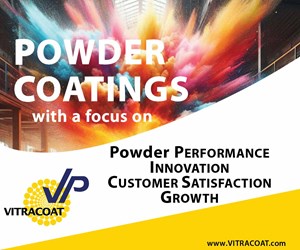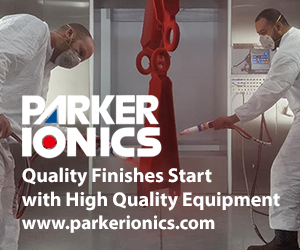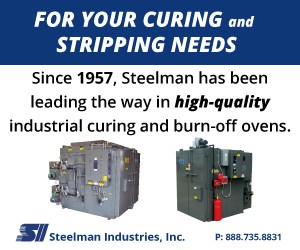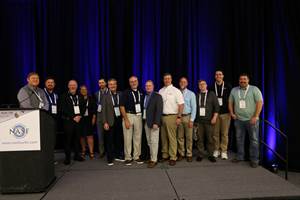UV Powder on MDF
Decorative Veneer brought innovation to the industry when it began using decorative vinyl films. Now it’s bringing innovation to the industry again with UV powder coating...
During the 1970s, 3M designed and created a vacuum-form machine to apply reflective vinyl film to road signs as a means to protect them from weather and debris. Maynard Snow, a Kalamazoo, MI, entrepreneur, purchased one of the machines and modified it to apply decorative vinyl film on furniture components.
Thirty years later, the company he founded, Decorative Veneer, is recognized throughout the U.S. as a premier supplier of quality decorative veneer panels and components to manufacturers of display fixtures and office, home and health care furniture.
While most companies would be satisfied with one such success story, Decorative Veneer is betting that lightning can strike twice. Only this time, the company’s president, Michael Knoblauch, is working with leading industry material and equipment suppliers to adopt UV powder coating technology as an alternative to vinyl film.
Though the demand for powder coating has nearly tripled during the past decade, increasing from 140 to 350 million lb/yr, until recently, applications on wood substrates, such as Decorative Veneer’s medium-density fiberboard (MDF) materials, have been virtually nonexistent. However, with the development of low temperature and UV-cured powder coatings, the timing from Decorative Veneer’s perspective is ideal.
Necessity is the Mother of Invention
Throughout the past three decades, Decorative Veneer has developed an expansive but defined product line around the process of vacuum-forming vinyl on MDF to make finished components that become part of a furniture system for office, health care, consumer electronics and home furniture. “The vinyl process is a viable process for these market applications,” said Mr. Knoblauch. “We can three-dimensionally finish a part, incorporating design elements that cannot be achieved in different processes. We can achieve radius corners, edges and recesses with a homogeneous finish and essentially no seams. Whereas a high-pressure laminate finish cannot accomplish these results, we’re able to form the vinyl over the substrate.”
However, as the barrier to entry into the market has decreased in recent years, Decorative Veneer found itself facing an onslaught of new competitors. “After 30 years, we began looking for new ways to grow the business, preferably in an environment that is process manufacturing versus batch manufacturing oriented. Following a lengthy investigation, the process we believe has the greatest potential for us is UV powder coating, partly because it allows us to use our existing customers or distribution channels, but also because the powder, application and curing systems have already proven themselves in other substrate finishing applications,” stated Mr. Knoblauch.
The Operation
The company began calling on its customers in September 2000 to introduce them to the powder on wood concept, demonstrate how the application works and describe the benefits of the new product. “Based on test results obtained at Nordson’s powder coating testing facilities, we were able to show finished product samples to our customers,” explained Mr. Knoblauch. “Without exception, they were absolutely positive about the potential of UV powder on wood.”
Wasting no time, Decorative Veneer broke ground in October 2000 for a powder coating operation at its Plainwell, MI, facility. Powder coating equipment from Nordson Corp. and UV/IR ovens from Nutro Corp. were shipped in February 2001; testing in the new 40,000-ft2 facility began in March and April, 2001.
The operation is situated in a 10,000-ft2, temperature-controlled powder coating room that currently houses a single powder coating booth and several hoppers to handle quick color changes. The room is designed to eventually accept a second booth that will accommodate even more and faster color-change requirements.
The Application System
The UV powder coating system can finish parts up to 97 inches long, 60 inches wide and 0.375 inch to more than 2 inches thick. Parts are manually hung on an overhead conveyor that travels only a short distance at 7.5-15 ft/min before entering a single, low-temperature (75-200F) convection oven that preheats the MDF.
Following the preheat process, parts pass through an Excel 2000® powder coating booth equipped with opposing racks of seven Versa-Spray® II guns on reciprocators. A single Sure Coat® manual spray gun is also available at the front and back end of the booth to reach deep recesses. Coating thickness ranges from 1.8-3.5 mils. The booth also features a Sure Coat® application controller and several hoppers to accommodate quick color changes.
Coated parts then pass through a second IR/convection oven to gel the powder and through a UV oven to cure the powder. Once finished, the parts are inspected, packed and shipped to customers.
Becoming an Industry Technology Leader
“We can now produce the same type of component with some of the inherent qualities of what we’re able to produce on our vinyl and in some cases improve on it,” proclaimed Mr. Knoblauch. “And we can produce them in a process-manufacturing environment; that’s the logic behind the purchase of the powder system. With the UV powder system, Decorative Veneer has also positioned itself on the front end of the marketing curve—having something that no one else has yet in an environment that has a pretty high barrier to entry. If you don’t have the distribution to fill the capacity, we see that as a barrier to entry. We believe we can fill up the distribution channel fairly quickly.”
Benefits/Advantages
UV powder coating on MDF offers numerous benefits, including: availability of a broad palette of colors, textures and glosses; thinner finish thickness (2-3 mils vs. 8-10 mils); use of standard MDF; nondestructive low-temperature preheating and flow coating; faster cycle times; and an environmentally friendly process (no VOCs or HAPs).
“DV’s powder coating and UV-curing process eliminates costly and time-consuming priming and prepping. Unlike common systems, premium grade MDF is not required, nor are high-temperature preheats and flow coats that can damage the substrate,” stated Mr. Knoblauch. “The result is an attractive, durable finish that outperforms traditional wet and laminate finish processes and greatly increases product design flexibility. The process will revolutionize the wood finishing industry.”
Related Content
Curing Oven Basics
Simply heating up the substrate does not cure the coating. There are many variables to consider when choosing the best cure oven for your application...
Read MoreProducts Finishing Reveals 2023 Qualifying Top Shops
Each year PF conducts its Top Shops Benchmarking Survey, offering shops a tool to better understand their overall performance in the industry. The program also recognizes shops that meet a set of criteria to qualify as Top Shops.
Read MoreConveyors and Paint Systems
Choosing the right conveyor system, coating technology, and ancillary equipment.
Read MoreCalculating the Cost of Powder Coating
How can you calculate the cost of powder coating a component if you only know its surface area? Powder coating expert Rodger Talbert has the answer.
Read MoreRead Next
Episode 45: An Interview with Chandler Mancuso, MacDermid Envio Solutions
Chandler Mancuso, technical director with MacDermid Envio discusses updating your wastewater treatment system and implementing materials recycling solutions to increase efficiencies, control costs and reduce environmental impact.
Read MoreA ‘Clean’ Agenda Offers Unique Presentations in Chicago
The 2024 Parts Cleaning Conference, co-located with the International Manufacturing Technology Show, includes presentations by several speakers who are new to the conference and topics that have not been covered in past editions of this event.
Read MoreMasking Solutions for Medical Applications
According to Custom Fabricating and Supplies, a cleanroom is ideal for converting, die cutting, laminating, slitting, packaging and assembly of medical-grade products.
Read More
.JPG;width=70;height=70;mode=crop)






